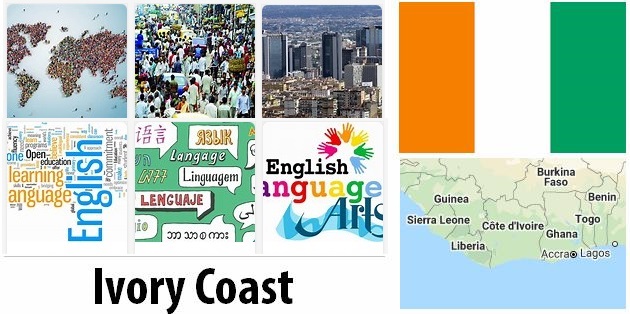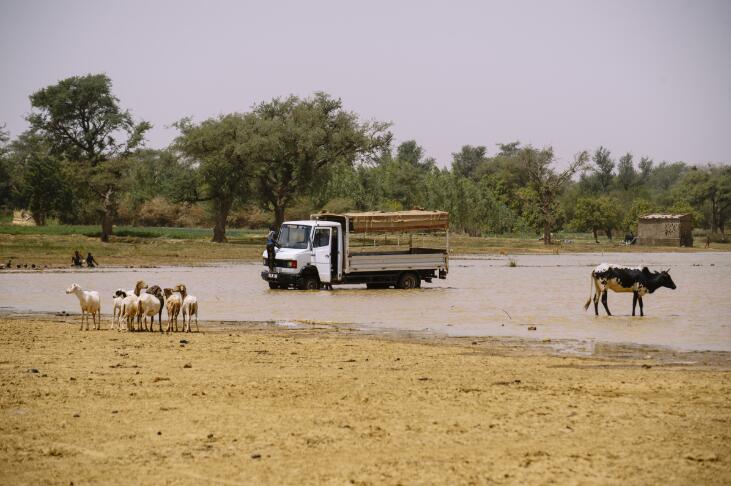Ivory Coast Population and Language
The population is unevenly distributed over the country, most people live in the area around the big city of Abidjan on the coast. Population growth is relatively high and about 40 percent of the population is under 15 years of age.
There are over 60 different ethnic groups in the country, which can be divided into four main groups: Akan people in the eastern and central Ivory Coast, Kru in the south-west, Mandate-speaking people in the west and north, as well as herb-speaking (voltaic) people in the northern and central parts of the country. The Akan people baulé is the largest group and traditionally dominates politics. Agni are also counted among the Akan people. Kru includes, among other things, bété and dida. Important mandate-speaking groups are malinké, diola, yacouba and gouro. The largest of the belt-speaking people is senufo. Several of the peoples are also located in neighboring countries.
- COUNTRYAAH.COM: Key populations estimated size and data of Ivory Coast, including population density of how many people per square mile. Also included are facts for population and language.
In the Ivory Coast also live millions of people who immigrated from Burkina Faso and other West African countries. According to a 2014 census, one in four residents are not Ivorian citizens. Previously, there were tens of thousands of Frenchmen in the country, but most of them left around 2004 after anti-French demonstrations (see Modern History). There is also a group of Lebanese, many of whom are traders.
The Ivory Coast has occasionally received many refugees, including from Liberia. Some of them have been integrated into society, while others have returned home.
Ethnic contradictions have been exploited in politics (see Political system), which has not least affected immigrants and their descendants. Immigration from neighboring countries was encouraged under Félix Houphouët-Boigny’s rule (1960–1993). Most immigrants were used as cheap labor in agriculture, but the regime also allowed newcomers to buy land. This policy was disputed, especially among the Beta and Kru people in the southwest. Their dissatisfaction could long be dampened by offers of education or employment in, for example, the army or the state administration. But when the economy deteriorated in the 1980s and 1990s, ethnic tensions rose to the surface. Since the introduction of the multiparty system in 1990, the contradictions began to be exploited by rival politicians (see Modern History).
The right to Ivorian citizenship and thus political influence has come to play a central role. Ivorians in the south claim that the country has been “invaded” by foreigners who demand rights that only “real Ivorians” should have. In 1998, laws were passed that everyone who owns land must be Ivorian citizens. Until then, many residents, mainly in the north, had not bothered to obtain citizenship. It is also important that the population in the north and the immigrants are mainly Muslims, while most in the south are Christians.
From 2000, violence against immigrants increased, but Ivorians in the north also suffered. During the civil war, hundreds of thousands of people were forced to flee to their “homelands”, while perhaps one million people were displaced within the country. The violence following the 2010 presidential elections created new refugee flows when around 100,000 Ivorians sought protection in mainly Liberia, Ghana, Guinea and Togo. According to the UN agency UNHCR, the number of internally displaced persons had dropped to approximately 300,000 in May 2016.
FACTS – POPULATION AND LANGUAGE
Population
baulé, bété, senufo, malinké, mande, dioula, agni et al
Number of residents
24 294 750 (2017)
Number of residents per square kilometer
76 (2017)
Percentage of residents in the cities
50.3 percent (2017)
Nativity/birth
36.8 per 1000 residents (2016)
Mortality/mortality
12.2 per 1000 residents (2016)
Population growth
2.5 percent (2017)
Fertility rate
4.9 number of births per woman (2016)
Percentage of women
49.3 percent (2017)
Life expectancy
54 years (2016)
Life expectancy for women
55 years (2016)
Life expectancy for men
52 years (2016)
Language
French is an official language, in addition there are some sixty local languages
2012
November
New money from France
France promises financial support to the Ivory Coast of EUR 630 million for the period 2013-2015. This includes both debt write-offs and development assistance.
ICC wants to prosecute Simone Gbagbo
An arrest warrant is issued by the ICC on November 22 for Simone Gbagbo, the ex-president’s wife, who is accused of committing crimes against humanity during the post-2010 violence.
New government is appointed
President Ouattara dissolves the government on November 14. According to some sources, this is because the PDCI opposed a proposal to have wives alongside men be seen as the head of a household. The government’s own declaration is about the need to speed up the economy. On November 22, a new government is formed under the leadership of Daniel Kablan Duncan, who was previously Foreign Minister. Daniel Kablan Duncan, who belongs to PDCI’s top tier, is a personal friend of Ouattara and is, like him, an economist. Several other new ministers are drawn from the business community and the banking world. New Minister of Justice will be Gnénéma Mamadou Coulibaly, who has close contacts with President Soro. Soro still has a strong position of power and is believed to have set his sights on the presidential post for the next election. Ouattara needs his support,
October
New rebel movement?
According to the UN Ivory Coast expert group, supporters of Gbagbo are building a rebel movement in neighboring Ghana to which many of them are moving (among them militia leader Blé Goudé, Gbagbo’s second wife Nady Bamba, Justín Koné Katinan and several other people from the top layer of the FPI). At the same time, militia groups must have been trained militarily in inaccessible jungle areas in eastern Liberia. Concerns also exist that Gbagbot faithful forces should employ Liberian mercenaries . However, these groups are not considered strong enough to threaten Ouattara’s rule. However, Ghana is said to have seized eight Gbagbo supporters in Accra in October.
At the end of October, the police and military are charged with Amnesty International for illegally arresting and torturing at least 200 people in connection with the attacks that have been carried out since August. Among the arrested are two leading FPI politicians, but also lower-level party members, all of whom deny any involvement in the killing.
Prison sentence for Gbagbo supporters
The first trial of one of Gbagbo’s supporters in the military’s top tier within the Republican Guard will begin at the beginning of the month. Bruno Dogbo Blé and four others have been charged with, among other things, kidnapping and murder in 2011. All five were sentenced to prison between 15 and five years. Blé has also been charged with the murder of junta leader Robert Gueï in 2002.
August
New acts of violence in Abidjan
Eleven soldiers are shot to death when armed men attack several targets in the country’s largest city of Abidjan. Similar attacks are also directed at the city of Douplay, where the assailants also exempt over 100 prisoners, who are also believed to have belonged to Gbagbo’s camp. Fire fighting in Abidjan requires at least four lives. The government blames the attacks on supporters of Gbagbo, but his party, FPI, denies any involvement. Several people are arrested, of whom more were part of the leadership change in the FPI. At the end of the month, 73 people are being prosecuted, including 19 soldiers, who are suspected of being involved in the attacks.
June
The domes revealed
On June 12, Interior Minister Hamed Bakayoko says plans have been unveiled for a coup against the government. According to the minister, it is the military and close advisers to Gbagbo who have planned a coup from the exile. Several people have been arrested, including one of the leaders, former Colonel Kate Gnotua, who returned to her home country a few months earlier.
Human rights organization criticizes Liberia and Ghana
In a report, Human Rights Watch (HRW) criticizes Liberia for failing to intervene against Ivorian militiamen and Liberian mercenaries who have committed serious abuses following the 2010 Ivory Coast presidential election. These must have continued to raid against Ivorian villages and are accused of having recruited child soldiers in Liberia. At least 40 people have been killed since July 2011, most from people who supported Ouattara. The Liberian government rejects the information that it has been passive on the issue.
HRW also accuses Ghana of not extraditing people from Gbagbo’s circle, who are there. This is despite the fact that they are suspected of financing border councils from Ghana into the Ivory Coast. Among those believed to be in Ghana include former leader of Young Patriots Charles Blé Goudé.
In Togo, however, Moise Lida Kouassi, a close associate of Gbagbo, is arrested and extradited to her home country.
Concern in the border area against Liberia
At least seven UN soldiers and eight civilians are killed in an ambush in the western Ivory Coast. There are suspicions that the assailants came from Liberia and that they had fought on Gbagbo’s side in the conflict. With the deed, which is the first direct attack on the UN troops in the Ivory Coast, Liberia tightens its guarding of the border area and closes the border with the neighboring country.
May
Minister may go after corruption charges
Adama Bictogo, Minister of African Integration, who played an important role as in the talks first with coup leaders in Mali and Guinea-Bissau, is forced to leave the government at the end of May after allegations that he had lost money, just over a million dollars, which would have gone to the victims of the 2006 scandal (see Natural Resources and Energy).
March
New government ready
On March 13, Oauttara appoints a new government with Jeannot Ahoussou-Kouadio as prime minister and himself as defense minister. Other ministers may remain. On March 9, Soro is elected President of the National Assembly.
February
ICC investigates more crimes
In February, the ICC announces that the Court will extend its investigation to crimes committed since 2002. According to the 2007 Peace Agreement, all amnesty was granted for all abuses committed during the period 2002-2007, but this is not approved by the ICC.




